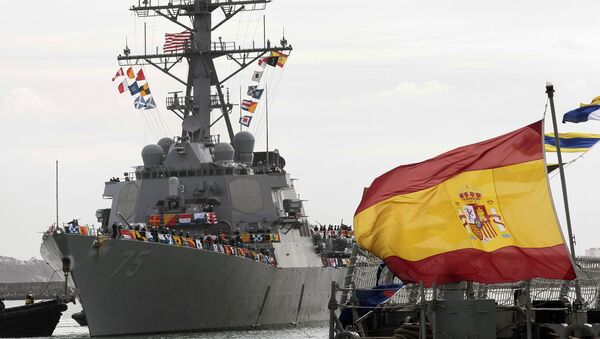On Feburary 8, President Trump spoke to Spanish Prime Minister Mariano Rajoy via telephone. In a bizarre twist, following the call, the two camps issued discrepant accounts of their conversation's agenda; Madrid alleged it centred on economics and trade, while in Washington's statement, NATO loomed large, in particular "the importance of all NATO allies sharing the burden of defense spending".
Whatever the truth of the matter, Mr. Rajoy made clear in a subsequent tweet the exchange was "cordial", and he was keen "to continue strengthening" the "beneficial" relationship between the two "allied" countries.
Cordial conversación con @POTUS para seguir fortaleciendo las relaciones en beneficio de nuestros pueblos. Somos países aliados. MR
— Mariano Rajoy Brey (@marianorajoy) February 7, 2017
Still, President Trump opting to focus on defense spending would be unsurprising. On the campaign trail, Mr. Trump repeatedly questioned the necessity of NATO in the 21st century, going as far to suggest the US could withdraw from the bloc entirely. Since his election as President, Mr. Trump has rowed back somewhat, although he has made clear the continued existence of NATO is contingent on other members meeting their expenditure requirements of two percent of GDP on defense.
Good talk with US President-elect @realDonaldTrump. We both underlined the enduring importance of #NATO and increased defence spending.
— Jens Stoltenberg (@jensstoltenberg) November 18, 2016
There is arguably no greater violator of this obligation than Spain, which spends under half that — 0.94 percent. While the country is not alone in failing to meet this goal — only the US, UK, Greece, Estonia and Poland do as of 2016 — it is consistently among the lowest spenders in the 28-member military alliance. Only Belgium and Luxembourg spend less, despite Spain — the seventh largest NATO member by GDP and population — dwarfing these nations.

What accounts for Spain's reticence to spend more on its military? While Spain's economy was badly damaged by the financial crisis and remains unstable in 2017, Dr. Carlos Flores Juberias, a constitutional law professor at the University of Valencia, says it's not simply economic considerations behind Spain's retreat from military expenditure. For one, Spanish security is not under threat at present — its only major dispute, notes Dr. Flores Juberias, is with Morocco over the status of exclaves Ceuta and Melilla, and this is "nothing more than a part of the country's usual nationalistic discourse". As a result, the country has better things to spend money on. However, it goes deeper than that.
"One of the Franco regime's most relevant pillars, and traditionally a consistently conservative institution, the Armed Forces are still seen in that way by parties of the Left, who are more than ready to ignore the radical transformation they have undergone in recent decades. Hence, defense spending is still viewed with suspicion, and the defense budget is as a rule the first to suffer cuts in times of crisis, and the last to become increased in periods of bonanza," Dr. Flores Juberias told Sputnik.
Spain's membership of NATO, while highly controversial at the time of application (1982), is in 2017 supported assumptively by least three of the largest parties in Spain's Parliament, Dr. Flores Juberias adds — and this blanket but passive support in Spanish politics is matched by "indifference" on the part of Spanish citizens.
"We simply assume or membership in the Alliance as a fact which does not bother and does not worry us," Dr. Flores Juberias concluded.
Prime Minister Rajoy may still be able to convince the Spanish public of the need to spend more on defense. He and President Trump will both attend a meeting of NATO leaders in Brussels in May.




